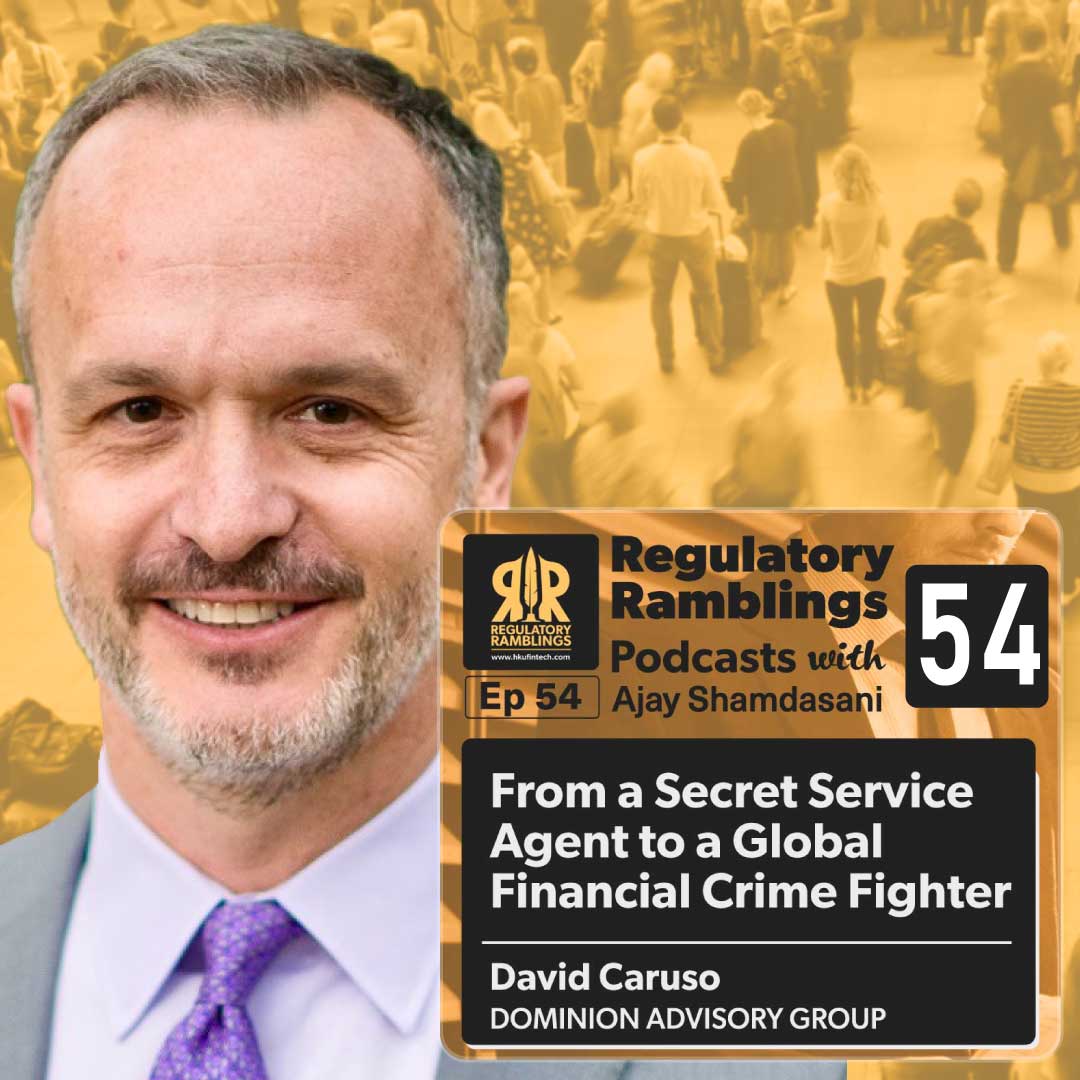David Caruso is the founder and managing director of the Dominion Advisory Group, a consulting firm based in Virginia, near the nation’s capital. The firm works with banks facing regulatory enforcement actions across the U.S., Europe, and Asia. David aids institutions and organizations in navigating financial crime risk and compliance modernization globally.
As a former special agent with the US Secret Service and a graduate of George Washington University since 1996, he has been at the forefront of shaping the financial crime risk and compliance profession more generally. Building anti-money laundering (AML) and sanctions compliance programs at banking and financial institutions across the US and internationally, overseeing headline-grabbing corruption and money laundering investigations, and building and selling a RegTech software firm have afforded him an ideal perspective to reflect on every major issue and trend occurring in the financial crime compliance space for the past 25 years.
In this episode of Regulatory Ramblings, David shares his reflections on a nearly three-decade career in AML and financial crime compliance with our host, Ajay Shamdasani.
He recounts having worked at global institutions like JP Morgan, Riggs Bank, Wachovia, Washington Mutual, and HSBC, to name a few. His notable achievements include his time as Riggs Bank’s chief compliance and AML officer.
In that role, he was hired to address some program weaknesses cited by the US Treasury Department’s Office of the Comptroller of the Currency (OCC). While at Riggs, David’s team uncovered two notorious international corruption schemes involving the government of Equatorial Guinea and former Chilean dictator Augusto Pinochet. The team’s work led to investigations by the Department of Justice and the U.S. Senate Permanent Subcommittee on Investigations.
The cases drew worldwide media attention from justice authorities in the US, UK, Spain, and Chile. The facts uncovered by David at Riggs shook US lawmakers and regulators, kicking off 10 years of active regulatory and law enforcement action against banks across the US.
After Riggs, David founded The Dominion Advisory Group in 2005. From his ringside seat near Washington, DC, he works closely with executive management, boards, and outside counsel to craft responses and build entire financial crime risk and compliance programs to address regulatory concerns—of which there has been no shortage in recent years.
David also discusses the allure of AML and financial crime compliance and what brought him to the professional path he has been on for over three decades. Methodologically speaking, he recounts what has changed in AML and financial crime in that time and what has remained the same.
He concurs that since 1970, so many additional requirements and expectations have been created that AML teams still need to catch up on their primary mission. Reflecting on the impact of the Bank Secrecy Act (1970), the USA PATRIOT Act (2001), the Foreign Account Tax Compliance Act (2010), or FATCA, and the more recent Anti Money Laundering Act (2020), he shares his views on how the impact of regulatory action has distracted from compliance professionals’ more critical tasks—with an eye towards how the regulatory exam-focused mindset of money laundering reporting officers (MLROs) affects operations and innovation.
David also depicts the pervasive and ongoing discrepancies between what domestic and international/supernational policy-setting organizations, like the Financial Action Task Force (FATF), based in Paris, say and what they do. He says, “No one wants to ask if new rules and regulations are working and whether they prevent crime or have the unintended consequence of reducing [economic] growth?”
He acknowledges the degree of geopolitical hypocrisy when it comes to AML and financial crime compliance, as well as when it comes to fighting bribery, fraud, and corruption internationally. Washington, New York, London, and Brussels all too often regulated the financial world. Yet, while the US and UK, and increasingly the EU, are some of the most aggressive jurisdictions regarding financial crime enforcement actions, their regulatory apparatus is often used to further their geopolitical goals. It is a view that many outside the West hold.
The conversation concludes with David’s views on why sanctions against Russia stemming from its 2022 invasion of Ukraine have largely been unsuccessful, how technologies such as artificial intelligence can help AML/KYC/FCC compliance, and what policy recommendations he suggests moving forward.
We are bringing you the Regulatory Ramblings podcasts with assistance from the HKU Faculty of Law, the University of Hong Kong’s Reg/Tech Lab, HKU-SCF Fintech Academy, Asia Global Institute, and HKU-edX Professional Certificate in Fintech.
Useful links in this episode:
You might also be interested in:
-
Must have new book by Ross Buckley, Douglas Arner & Dirk Zetzsche – FinTech: Finance, Technology & Regulation
-
Building Better Financial Systems: FinTech Sustainability – Research
-
HKU-SCF Fintech Academy – website
-
Asia Global Institute – website
-
Most sought-after Fintech course on edX – Introduction to Fintech
Connect with RR Podcast at:
LinkedIn: https://hk.linkedin.com/company/hkufintech
Facebook: https://www.facebook.com/hkufintech.fb/
Instagram: https://www.instagram.com/hkufintech/
Twitter: https://twitter.com/HKUFinTech
Threads: https://www.threads.net/@hkufintech
Website: https://www.hkufintech.com/regulatoryramblings
Connect with the Compliance Podcast Network at:
LinkedIn: https://www.linkedin.com/company/compliance-podcast-network/
Facebook: https://www.facebook.com/compliancepodcastnetwork/
YouTube: https://www.youtube.com/@CompliancePodcastNetwork
Twitter: https://twitter.com/tfoxlaw
Instagram: https://www.instagram.com/voiceofcompliance/
Website: https://compliancepodcastnetwork.net/



